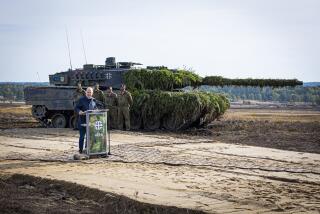U.S. Media Draw Bonn’s Ire Over Libya
- Share via
BONN — Chancellor Helmut Kohl has complained to the U.S. government about accusations in the American media that West German companies helped to build a chemical weapons plant in Libya, his chief spokesman said Friday.
“The West German government regards the form and content of the discussion being carried out through parts of the U.S. media as unhelpful,” said spokesman Friedhelm Ost at a news conference.
At the same time, Foreign Minister Hans-Dietrich Genscher revealed that Libyan officials told the West German ambassador in Tripoli that they agree with the principal of international inspections of chemical plants but only as part of an overall ban on chemical weapons.
The word passed from Libyan leader Moammar Kadafi through Ambassador Juergen Hellner was that Libya would allow inspections of its chemical plant under an international accord but refused to be singled out for challenge inspections, the Foreign Ministry said Friday.
Talks Due in Paris
Foreign Ministry sources said that Genscher would try to discuss a chemical weapons ban with his Libyan counterpart in Paris during the conference on chemical weapons that begins today. They said he will also ask Secretary of State George P. Shultz about speculation that the United States plans to destroy the Libyan plant by military force.
Kohl’s spokesman Ost said that the United States has not provided the government with enough hard evidence on the reported involvement of West German companies in building the Libyan plant--despite repeated requests from Bonn.
Ost said that Kohl had originally been told of American suspicions of West German companies’ complicity in building the plant during the chancellor’s visit to Washington on Nov. 15, and he promised at that time to investigate.
According to the spokesman, American officials said they would provide detailed information implicating the West German firms--singling out Imhausen-Chemie, based in Lahr in southwestern West Germany. But Ost said that no firm evidence was provided about any role of the company in supplying or building the Libyan chemical complex, which Kadafi has said will make pharmaceuticals.
‘An Expert Team’
In discussions with the Americans, the spokesman said, “it was agreed that an expert team would be sent to Germany to brief German authorities.”
But the American team that discussed the case here on Dec. 22 “could not give any concrete information,” according to Ost.
“They just confirmed their belief that the German enterprise, Imhausen, was responsible for the planning of the plant,” he said.
The Americans agreed to provide further evidence, but they had not done so by the time the U.S. accusations became public last Sunday in an article in the New York Times and have not done so since, Ost said.
No Evidence Found
Ost said that the West German government’s investigation of Imhausen-Chemie covered the period 1984-88 but that “no clues were found that Imhausen-Chemie had exported planning documents for the construction of a chemical plant--or export of know-how.”
In Washington, State Department spokeswoman Phyllis Oakley said of West Germany: “We are confident that it is taking the information we have provided very seriously and is investigating fully. With regard to the Libyan (chemical weapons) program, we understand that the appropriate West German authorities are still conducting their investigations.”
Nonetheless, Ost’s public statements criticizing U.S. procedures on the matter seem to reflect a growing split between the United States and West Germany in which other issues are also involved, observers here said. These include low-flying military training flights by American planes, the European Community’s ban on imports of hormone-fed U.S. meat and U.S. pressure on Bonn to expand the West German economy.
More to Read
Sign up for Essential California
The most important California stories and recommendations in your inbox every morning.
You may occasionally receive promotional content from the Los Angeles Times.













